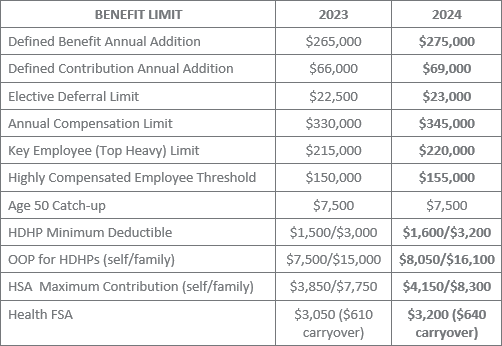The November Monthly Minute digs into the new proposed LTPT regulations, 2024 benefit limits, and the NBA health plan fraud verdict.
Indigestion from Turkey and Stuffing or the IRS’ Proposed LTPT Regulations?
Retirement plan professionals were jolted out of their post-Thanksgiving slumber by the IRS’ release of the highly-anticipated proposed long-term, part-time (LTPT) employee regulations. The proposed LTPT regulations reflect statutory changes made by the SECURE Act and SECURE 2.0. As reported in the January 2023 Monthly Minute, employers must allow long-term, part-time workers to participate in 401(k) plans with the result that a part-time employee must complete either 1 year of service (with the 1,000-hour rule) or 3 consecutive years of service (with the 500 hour rule) under the SECURE Act -- which was reduced to 2 years under SECURE 2.0.
Noted below are a few key points of the proposed rules to help guide plan sponsors through the new LTPT landscape:
- The new guidance makes clear that the special rules that apply to LTPT employees apply only to those employees who are eligible to participate in a qualified CODA solely by reason of satisfying the statutory LTPT service requirement. Thus, an employee who becomes eligible to participate in a qualified CODA immediately or by reason of having completed any other service requirement would not be a LTPT employee.
- Another area of ambiguity was the impact of the LTPT employee rules on other eligibility conditions. The proposed rules confirm that the LTPT employee rules do not preclude a plan from establishing an eligibility condition that must be satisfied in order for an employee to participate in the CODA, as long as the condition is not a proxy for imposing an impermissible age or service requirement. For example, a bona fide class of employees may be excluded from eligibility as long as it is not an attempt to impose an impermissible age or service requirement.
- Vesting is another area that is rife with questions under the LTPT employee rules. The proposed regulations provide that LTPT employees earn vesting service for years when the employee performs 500 hours of service even if the LTPT employee is not entitled to any employer contributions prior to earning 1,000 hours.
- Furthermore, the proposed regulations state that LTPT employees who become eligible to participate due to LTPT status but subsequently complete 1,000 hours would still be subject to the special LTPT vesting rules. Thus, a former LTPT employee would generally continue to be credited with a year of vesting service for any 12-month period during which the former LTPT employee is credited with at least 500 hours.
The breadth and density of the proposed rules is especially significant considering that they become effective so shortly after their holiday-weekend release. The new rules apply to plan years that begin on or after January 1, 2024, and taxpayers may rely on the proposed rulemaking until final guidance is issued. Plan amendments are generally not required until December 31, 2025.
KMK Comment: In addition to eligibility and vesting, the proposed rules also address LTPT entry date requirements, determination of 12-month periods for service-crediting purposes, and the impact of LTPT employee status on discrimination testing. Considering the complexity of the proposed rules and the fast-approaching effective date, it is essential for plan sponsors to carefully coordinate compliance and plan amendments with legal counsel and administrators without delay.
IRS Increases COLA Adjustments for 2024
Something to be grateful for: the IRS has announced annual COLA adjustments in Notice 2023-75 and Rev. Proc. 2023-23. Below are select increases.

Slam Dunk for Prosecutors in NBA Health Care Fraud Win
Earlier this month, a New York jury found former Celtics player Glen “Big Baby” Davis guilty of health care fraud and Will Bynum, a former Pistons player, guilty of conspiring to make false statements. The verdict brings to a close a health care fraud case that involved 19 NBA players (the ringleader of the scheme, former Nets player Terrence Williams, was sentenced to 10 years in prison after pleading guilty as reported in the September 2022 Monthly Minute) as well as several medical professionals, submission of at least $5 million of false claims and $2.5 million in fraudulent proceeds. Reported examples of false claims included players receiving dental crowns on the same six teeth on the same day, and services allegedly provided in California despite the players’ physical presence elsewhere (e.g., in Nevada or Taiwan). U.S. Attorney Damian Williams stated that the conviction of Davis and Bynum “exemplifies that despite notoriety or success in sports or any other field, no one is exempt from criminal charges if they engage in fraud.”
KMK Comment: The government spared no expense in uncovering the NBA players’ scheme in the hopes of curbing fraud and escalating health care costs. Hopefully, the notoriety of the case will deter individuals from similar conduct and save plan sponsors the needless expense that flows from such criminal conduct.